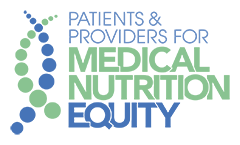Having medical nutrition coverage would mean that I get to live my life without worrying. I’ve had to move to different states in the past for school and work, and my first thought is always, “Will my formula be covered?”. Even though, both formula and food are required to manage PKU, I don’t even get to think about having medical food coverage because the chances of having formula coverage are often so low. Having this barrier to live my life is unrealistic. My husband and I are looking towards our future for where we want to settle down and start having kids, and I don’t even get to consider living close to my parents because they live in a state with zero medical formula coverage or state-mandated insurance coverage. This means that I would have to pay a large monthly out-of-pocket expense for my formula in order to function.
I am fortunate now to be living in a state that provides my formula, but I was previously living in a state that only offered partial insurance coverage through my employer. What I didn’t realize was that when I received my formula from a third party supplier (not the direct manufacturer), the cost of my formula tripled and my out-of-pocket expense was the same as if I were to purchase it directly from the manufacturer. I lived there for two years, moved one year ago and I’m still making out-of-pocket payments, and will need to for the next few years. Due to the cost of medical food, I am rarely able to make purchases. Throughout college I was able to buy medical food about every one to two years. Not having access to low protein foods during college made school even more challenging because I had to work extra hard at managing my diet with normal grocery items which basically means fruits and vegetables. Fortunately, I graduated and am now a Registered Dietitian, but not having access to low protein food – the required treatment to manage PKU – made my college experience more challenging and stressful than it needed to be. Even after graduating and starting my career, I still have difficulty making regular low protein food purchases due to my student debt and medical formula debt.
Without medical nutrition coverage, I may not have the ability to effectively manage my diet. Any time I am in a stressful situation, whether it be at work or a major life transition occurs such as moving or starting a new job, I find myself having a harder time managing my diet. This puts me at risk for elevated phe levels which leads to irritability, severe eczema break outs, and decreased executive functioning. This not only affects my personal life, but my career and ability to do my job. In the next few years I plan on starting my family and having kids. Diet management is extremely important before, during, and after pregnancy in order to ensure no complications and the health and safety of my future children. The only way to effectively manage my PKU during pregnancy is through diet. Given the barriers to regularly purchase or access low protein foods (and potentially formula if we move), puts myself and my future unborn child at risk for a complicated pregnancy and cognitive and/or developmental problems. Having medical nutrition coverage would mean that I’m guaranteed diet/PKU management, which means I’m guaranteed to be myself, have healthy children, and be a functioning member of society. I currently receive state coverage for my medical formula. I make monthly orders through my clinic and the state covers and provides my formula. I do not have any coverage for low protein medical food which is an important component to managing my phe levels. I make out-of-pocket purchases for medical food. I am also still making out-of-pocket payments for medical formula I received while living in a different state that didn’t provide full coverage.
